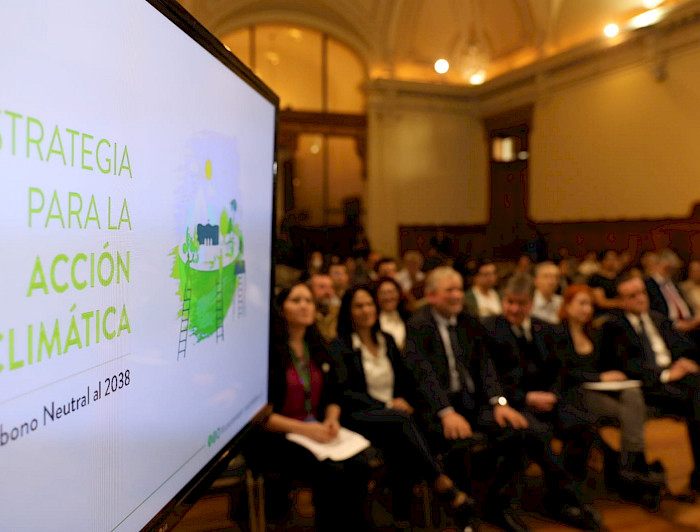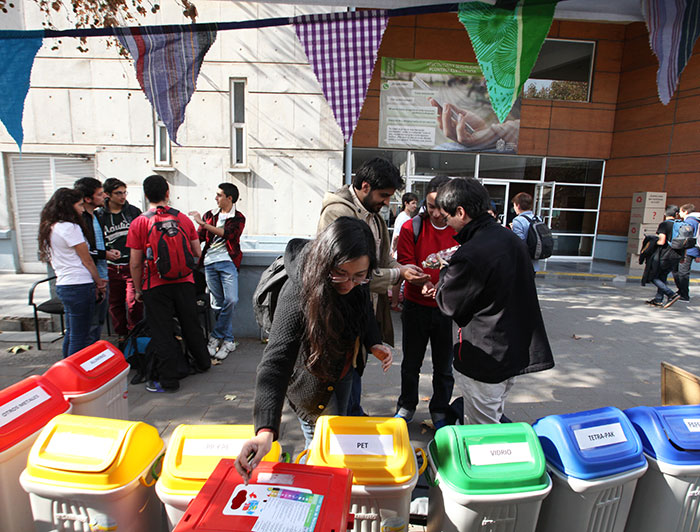
Pathways to Carbon Neutrality: UC Chile Climate Action Strategy Unveiled
A diverse assembly of authorities, professors, administrative and professional staff, students, and guests gathered for the unveiling of the UC Chile Climate Action Strategy, a pivotal document designed to steer the university toward its goal of achieving carbon neutrality by 2038.

photo_camera "(...) the efforts that the UC Chile community can make to pollute less creates a new culture within the university and most importantly, a culture that permeates the whole of society," said President Ignacio Sanchez during the launch of the Climate Action Strategy on October 12. (Photo by: Karina Fuenzalida).
In 2019, during the COP25 summit, UC Chile embraced the ambitious goal of achieving carbon neutrality by 2038. This initiative aligns with our institution's upcoming 150th anniversary and exceeds the country's 2050 goal by 12 years. A commitment to increase its contribution to curbing the effects of global warming affecting our planet.
Global warming is a symptom of a larger problem: climate change, a phenomenon defined as a series of variations in climate that can be natural or anthropogenic. However, current climate change has a last name: anthropogenic climate change, i.e., variations in the atmosphere with extreme events caused by the increased emission of greenhouse gases, mainly CO2 or carbon dioxide, as a result of human activity.
The ongoing climate crisis, with global warming on track to exceed the 1.5°C limit this century, according to the latest report of the Intergovernmental Panel on Climate Change (IPCC), demands immediate action. Every temperature rise intensifies dangers like heatwaves, heavier rainfall, droughts, and extreme weather, posing increased threats to both human health and ecosystems.
Amid this urgent context, our university actively joined the global effort to combat climate change. Since 2020, extensive efforts have been undertaken across 10 thematic working groups, involving professors, researchers, professionals, administrative staff, and students. Each group, led by a coordinator and overseen by the UC Chile Climate Action Council, worked toward creating a comprehensive UC Chile Climate Action Strategy. This strategy includes aspects of resilience, adaptation, research, education, and cultural change.
Climate action refers to efforts made to fight climate change and its impacts. These efforts include reducing greenhouse gas emissions (climate mitigation) and/or taking steps to prepare for and adapt to both the current impacts of climate change and expected future impacts (climate adaptation). In higher education, Climate Action should involve reducing greenhouse gas emissions, adapting to climate change impacts, implementing institutional policies, and promoting climate change education and awareness.
UC Chile President Ignacio Sánchez sees this document as the UC Chile community's initial effort in diagnosing and proposing actions toward carbon neutrality, climate action, and academic initiatives. "We understand that significant solutions must stem from substantial political decisions. However, we also recognize the cumulative impact of individual efforts. The steps the UC Chile community can take to reduce pollution not only foster a new culture within the university but, more importantly, contribute to a broader societal shift," he emphasized during the strategy's presentation ceremony on October 12.
As stated by Maryon Urbina, Director of UC Sustainability, this document serves as a blueprint for the institutional and university community's sustainability initiatives. It includes projects demanding a robust institutional commitment while also assigning responsibility to every member of the UC Chile. It encourages a shift in daily habits toward more sustainable practices.
Catalina Santelices Brunel, a law student and co-founder of the international organization “Latinas for Climate”, highlighted the importance of the strategy at the launch ceremony. She emphasized that the university, in its national leadership role, must not overlook such a critical aspect as climate action. “We need to move fast and be efficient, but let's remember, this is just an initial step—quite an important one. It's setting the stage nationally, and with luck, other universities will jump on board and keep the momentum going for climate action.”
Climate Action Strategy

In 2018, our university's carbon footprint, representing the total greenhouse gases (GHG) emitted directly or indirectly by its activities, amounted to 42,939 tons of CO2 equivalent. The objective of carbon neutrality is to attain a net outcome where the UC Chile's emissions, capture, and offset efforts balance out to zero.
The Climate Action Strategy outlines key actions for the upcoming years. To achieve carbon neutrality by 2038, it's crucial to implement measurable steps, emphasizing mitigation efforts through projects and community habit changes.
The future challenge involves enhancing UC Chile's ability to capture emissions across all its locations, primarily through carbon extraction and storage. Offsetting emissions is viewed as a last resort for the institution.
However, this commitment brings with it a number of challenges. Sebastian Vicuña, Director of the UC Global Change Center, highlighted both technical and cultural challenges. "Technically, we need to figure out how to compensate for the emissions of students, professors and researcher, especially from transportation; ideally through carbon sequestration. On a cultural level, the shift involves transforming institutional responsibility into personal responsibility. Many of the emissions are more personal, so reducing them is about personal choices,” he added.
The action plan considers 18 projects, presented by topic, among which the following stand out:
· Energy and Construction: A new Energy Management System (SGE) for our institution is proposed and has been advanced, along with a sustainability certification (CES) for all new buildings larger than 1,000 m2, as is already the case for the new campus of the UC School of Veterinary Medicine. In addition, climate conditioning is already being implemented in buildings and premises of our university, such as the recent construction for service officers.
· Transportation: A plan to promote sustainable urban mobility will be encouraged and the UC Chile will be provided with cycling infrastructure and bicycles to promote their use. These actions include the installation of charging stations for electric vehicles on the Casa Central, San Joaquín and Villarrica campuses, the renovation of bicycle racks, and the expansion of the bicycle fleet of the Bicycle Sharing System (SIBICO). Regarding long-distance transportation, a plan to promote green mobility and a travel registry for footprint calculation will be promoted.
· Waste: The university has made commitments and progress in infrastructure and equipment for recycling, reuse and waste reduction, along with management and promotion in this area, such as the increase in the number of Green Points in the courtyards, the installation of recycling transfer stations, and the expansion of the Punto Limpio Central (Central Clean Point) on the San Joaquín campus, among other actions.

· Water and Biodiversity: UC Chile is committed to implementing an effective water management system for its buildings and spaces, incorporating measurement, monitoring, and a biodiversity action plan. This involves diagnosing consumption by building, creating an action plan for consumption reduction, gradually replacing high-water-consumption gardens with low-water-consumption species, and initiating reforestation on the San Joaquín campus, soon expanding to Pirque.
· Culture, Training and Research: Plans will be implemented to raise awareness and disseminate institutional climate actions, educate and promote climate action awareness within our community, and conduct research to support climate action.
This document, slated for review and update every three years, serves as the guiding framework for attaining carbon neutrality. It can be accessed at www.sustentable.uc.cl
“With this climate action strategy we reinforce the commitment made by the university to sustainable development for more than a decade now. Caring for our common home, of our planet, requires collective and concrete institutional actions in which society as a whole is co-responsible and where higher education institutions play a strategic role," concluded the UC Chile President.


